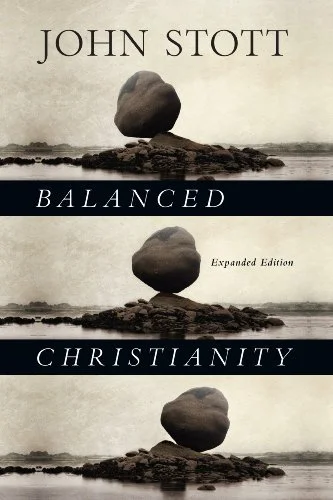Balanced Christianity
As a rule of thumb, the Christians who make headlines tend to be those who go to extremes or who succumb to scandals. If you’re looking for notoriety, moderation, nuance, and quiet faithfulness will generally only get you so far. For precisely that reason it’s interesting to consider the enduring—and arguably increasing—influence of John Stott, more than 90 years after his birth and nearly three years since his death.
Over the course of half a century, John Stott wrote just about a book a year. He was the chief architect of the Lausanne Covenant, which remains unparalleled as a concise statement on evangelical world mission. He laid out a sane, biblical case for Christian social responsibility that is more relevant than ever before. As the founder of Langham Partnership, he designated his significant book royalties to pay for the equipping of Christian scholars and ministers from the Global South. Through the London Institute for Contemporary Christianity he cast a vision for whole-life discipleship for Christians in the UK and beyond. Billy Graham, another evangelical figure whose notoriety owes nothing to scandal, wrote a moving tribute to Stott when he was named to the Time 100 list in 2005. After his death, one obituary described Stott as “an architect of 20th-century evangelicalism.”
It’s not that Stott never ruffled feathers. It’s not that he wasn’t criticized. It’s not that he was perfect. But his brand of evangelicalism was winsome and charitable—and not, incidentally, because of a lack of conviction. (His final rallying cry, after all, was to “radical discipleship.”) It could be said that the winsome public expressions of his evangelical faith—his preaching, writing, and equipping—grew out of the soil of the Anglican tradition to which he belonged, which for centuries has valued pursuing the via media between extremes.
Forty years ago Stott published a slim book in keeping with the via media tradition, called Balanced Christianity, and it has just been reissued in an expanded edition by InterVarsity Press. On the opening page, Stott writes this:
My concern is to draw attention to one of the great tragedies of contemporary Christendom, a tragedy which is especially apparent among those of us who are called (and indeed call ourselves) evangelical Christians. In a single word, this tragedy is polarization, but I shall need to spell out what I mean.
In the pages that follow, that’s precisely what he does, tackling four perennial polarizations. Christians, he writes, have a tendency to polarize on the basis of intellect and emotion. We fight culture wars over the labels conservative and radical (these days, conservatism is more often pitted against liberalism). We argue over form and freedom. And, as alluded to earlier, we can’t for the life of us seem to reconcile evangelism and social action.
In response to each of these polarizations, Stott calls for a nuanced, mature approach that’s much closer to a both-and than it is to an either-or, even if he does indicate his own leanings on each. Similar to the way Richard Foster treats the six different traditions or “streams” of Christianity in his timeless book Streams of Living Water, in this work Stott affirms the merit of different postures, stances, and emphases, while also pointing out the ways in which we are all at times prone to go to unhealthy extremes.
Helpfully, he makes the distinction between specialization and polarization. There’s room for specialization, he says, but polarization over secondary issues should always be resisted. To take but one example, some of us are primarily gifted as evangelists or preachers of the Word, while others are uniquely gifted to minister to the needs of the poor. Evangelism and social action are both essential parts of a fully orbed biblical faith, but some of us will specialize in one area more than another. And assuming we belong to a church that values some form of biblical balance, we’ll certainly be in fellowship with those gifted in ways we are not. That’s a good thing. What’s destructive is when we seek to discredit or minimize the importance of those with other areas of giftedness.
A related point that Stott makes is this: to be faithful to scripture can mean being agnostic on things the Bible leaves murky. Let’s face it: there are some things in scripture that simply aren’t all that clear. Because of that, it follows that being dogmatic about every theological point isn’t necessarily the same as faithfulness to scripture. In other words, it’s fine to speculate whether Adam and Eve had belly buttons (for the record, I come down firmly in the “no” camp), but we probably shouldn’t split churches over differences of opinion on the matter.
None of the reflections in Balanced Christianity are particularly headline-worthy. Few lines were even very tweetable, which was quite a disappointment. But what this book lacks in flash is more than made up for by good pastoral counsel on problematic areas from someone who followed Jesus faithfully for many, many years.
Normally, the formula for selling a lot of books is to take convenient, headlines-grabbing stances on polarizing issues. This way you rally your ideological tribe, and they buy books not just for themselves, but for family and friends (and perhaps for a few “enemies” as well). If you really do it right, your harshest critics buy the books in jaw-dropping numbers too.
I’m grateful John Stott had no interest in playing that game. And paradoxically or not, because he took the road less traveled—the path of prayerful, thoughtful discernment—his decades-old books are reissued, and a new generation has the chance to discover his accessible, patiently-acquired wisdom.
For all his important contributions, and all the notoriety that has followed, one of the greatest compliments I can think of to honor his memory is to say that John Stott wasn’t a theological stunt man.
